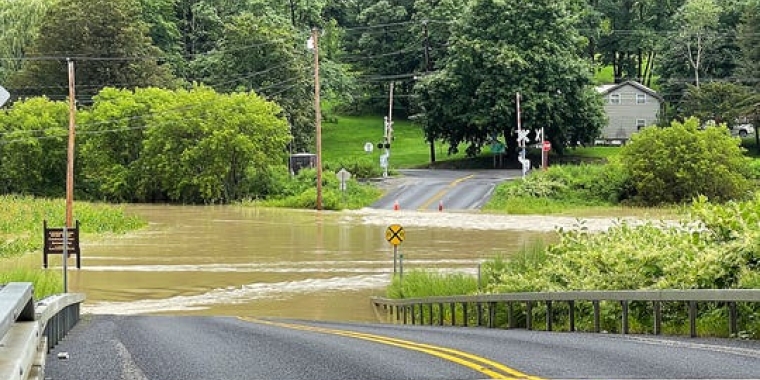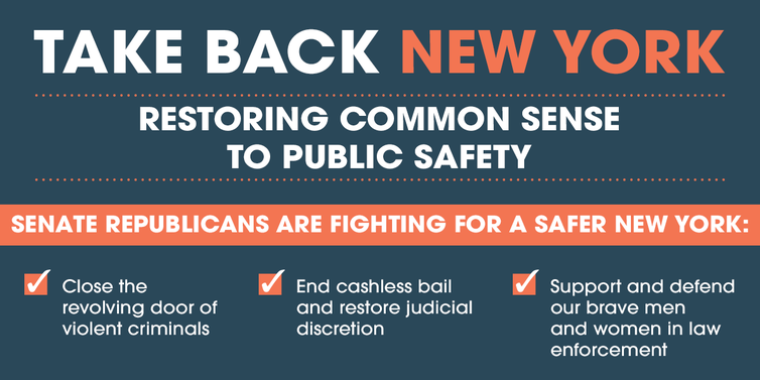
Senator O'Mara's weekly column 'From the Capitol' ~ for the week of September 27, 2021 ~ 'Dark spots in governor's vision for NY's energy future'
September 27, 2021
-
ISSUE:
- Energy

Senator O'Mara offers his weekly perspective on many of the key challenges and issues facing the Legislature, as well as on legislative actions, local initiatives, state programs and policies, and more. Stop back every Monday for Senator O'Mara's latest column...
This week, "Dark spots in governor's vision for NYS's energy future"
New York Governor Kathy Hochul has now put forth one of her administration’s most ambitious public policy proposals to date and, in doing so, gave all of us a good look at her administration’s vision for addressing one of our state’s most urgent short- and long-term challenges: energy.
With that in mind, it’s fair to say at this juncture that the Hochul administration is squarely following in the footsteps of the Cuomo administration – which only continues to raise serious and troubling questions for Upstate New York energy consumers (that’s us ratepayers), businesses (particularly manufacturers), and communities who will be asked to bear a heavy burden for the cost of subsidizing New York City, downstate energy demands.
Governor Hochul took the reins of a Cuomo-generated renewable energy strategy already in motion and has now advanced specific projects to accomplish its far-reaching aim to extend the state’s energy grid through a significant expansion of wind, solar, and hydropower projects.
Overall, the goal remains to meet at least 70% of the state’s energy needs through renewable energy sources by 2030.
The statewide goal remains laudable, but utopian. As a longtime member of the energy committees in both the Senate and Assembly, I have said and continue to fully agree that New York State should be leading the way in renewable energy development, and we are.
At the same time, I continue to stress that it needs to be done in ways that make sure that our residents and businesses have the energy they need right now to live and thrive in New York – and, I’ll add, that every step is taken to ensure that New York-based companies, entrepreneurs, generators and investors are always first in line when it comes to the jobs, revenues, and other economic development benefits being promised by the state’s leap into the so-called “green economy.”
Consequently, Governor Hochul’s announcement last week laid bare some troubling directions and a pipeline full of unanswered questions.
In unveiling the cornerstones of her plans, Governor Hochul said, “These transformative projects are a win-win – delivering thousands of new good-paying jobs throughout the state and attracting billions of dollars in private investment. They also help us turn the page on New York City’s long-standing dependence on fossil fuels.”
It potentially could have been a “win-win” to write home about, except that Governor Hochul gave away one of these wins for New York State.
Exhibit A is one of the plan’s centerpiece proposals, the Canada-based Champlain Hudson Power Express. It calls for a nearly 340-mile span of buried cable, traversing land and water, to bring Canadian hydropower and wind from Hydro-Quebec to an energy station in Queens, New York City.
First and foremost, the plan fails to detail the costs of what can only be described as a massive and complex undertaking or, most importantly, the extent to which ratepayers throughout the state will be on the hook for covering these costs through higher utility bills.
Affordability seems to be a factor completely disregarded in Governor Hochul’s choice of these transmission projects. The other approved project, Clear Path, is to be built 174 miles “underground,” a requirement that will conservatively increase the cost by 10 to 20 times.
Equally puzzling, why is New York State gifting to Canada a marquee green-energy project that could help create thousands of good jobs and spark badly need economic development in numerous Upstate communities? Why forfeit this win? Trust me, there are plenty of New York State-based, private-sector generators more than eager for an opportunity like this one.
In fact, the proposed Champlain Hudson Power Express completely bypasses Upstate New York. There is not even an interconnecting Upstate converter station to allow Upstate power companies to tap into this supply, nor for Upstate electric generators to use this energy highway to get New York State-produced electric to the downstate markets in need of it. The lack of requiring an Upstate juncture perpetuates a bottleneck that has existed for far too long and places far too much reliance on foreign power. Furthermore, it fails to allow an alternative source of needed power in case of a potential drought in Canada eliminating this supply.
The Independent Power Producers of New York (IPPNY) reacted to this proposed outsourcing of jobs, exorbitant costs, and the bypassing of in-state generators in a statement.
IPPNY President and CEO Gavin J. Donohue said, “In addition to its hefty price tag, the Champlain Hudson line has long brought concerns of outsourcing New York jobs and lackluster emission reductions due to ‘greenwashing.’ While the State’s process will ultimately verify the source of the power on the line, giving this opportunity to a Canadian company rather than New York’s generators who have stepped up to the plate time and time again is wrong.”
Last week, Governor Hochul reinforced for all of us a vision for the future of energy in New York State that leaves plenty of us wondering about its practicality, cost, and fairness -- particularly for Upstate New York.
It’s a vision that we can never afford to have guided by political goals taking precedence over the best path to keeping the lights on for all New Yorkers in the most practical, cost-effective, smart, and fair way.
###
Share this Article or Press Release
Newsroom
Go to Newsroom


